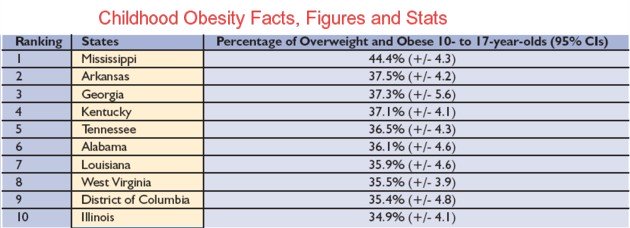Childhood Obesity Facts
It's important for anyone who cares for the well-being of their child to know the facts, figures and statistics of childhood obesity. It will help you to have an idea of just how bad the situation has become, and decide to embark on a healthy eating journey which will turn into a lifestyle for you and your family. In just about every nation on the face of this earth, obesity, more so childhood obesity is fast on the rise. The causes are many but it appears that a change in lifestyles is a major contributor.
 More than two-thirds, that is 67%, of the American adult population are either obese or overweight. Based on a national survey, obesity rates in adults have grown from 15% in 1980 to 34.3% in 2006. Right now, there are more Americans who are obese than those who are overweight. In the meantime, the rates of obesity among children have not declined or remained stagnant either. In fact, childhood obesity facts have shown that they have more than tripled since 1980 for children ages 2 to 19 years. Nearly 32% of American children and adolescents are obese or overweight. Just about 60% of obese children aged 5 to 10 years have had at least one cardiovascular disease (CVD) risk factor, such as high blood pressure and 25% have had 2 or more CVD risk factors.
More than two-thirds, that is 67%, of the American adult population are either obese or overweight. Based on a national survey, obesity rates in adults have grown from 15% in 1980 to 34.3% in 2006. Right now, there are more Americans who are obese than those who are overweight. In the meantime, the rates of obesity among children have not declined or remained stagnant either. In fact, childhood obesity facts have shown that they have more than tripled since 1980 for children ages 2 to 19 years. Nearly 32% of American children and adolescents are obese or overweight. Just about 60% of obese children aged 5 to 10 years have had at least one cardiovascular disease (CVD) risk factor, such as high blood pressure and 25% have had 2 or more CVD risk factors.
It appears that the number of children who are obese or overweight may have peaked, after years of steady increase. This is according to A 2008 analysis of data from the National Health and Nutrition Examination Survey (NHANES). According to the researchers at the Centers for Disease Control and Prevention (CDC), there was no significant change in terms of statistics, in the number of children and adolescents aged 2 to 19 with a high Body Mass Index (BMI) for age between 2003-2004 and 2005-2006.That was the first time the rates did not increase.
However, when we look at it now, rates are on the rise fast, such that the CDC projects that 48.3 million Americans will have diabetes by 2050. Obesity and diabetes are co-related, such that the term diabesity has been coined to explain how they are related. You may also read the article childhood obesity and diabetes for more information on how it can affect your child. In 2007, data from the National Survey of Children's Health (NSCH) found out that more than a third, of children ages 10 to 17 years are obese or overweight . That translated to 16.4% for obese kids and 18.2% for overweight kids.
In England, things do not differ that much. In 1995, 11.1% of boys aged 2 to 15 years, and 12.2% of girls the same age were classified as obese. This figure went up in 2008 to 16.8% and 15.2% respectively. Further breaking the group into two, childhood obesity facts showed that in just a space of thirteen years,that is from 1995 to 2008, those aged 2 to 10, obesity increased overall from 9.7% to 14.4% among boys and from 10.6% to 13.3% among girls.
In the 11-15 years age group, obesity among boys also increased from 13.9% to 20.6% and from 15.5% to 18.3% among girls and this also happened between 1995 and 2008. In 2008/09, data from the National Child Measurement Programme for England (NCMP) showed that one in ten pupils, 9.6%, in Reception class and a fifth, 18.3%, of pupils in Year 6 were classified as obese.
Childhood Obesity Facts and figures 2009 and 2010
In the United States, F as in Fat examined the obesity trends of that country and with regard to children, they found out that
- There are ten states which have the highest rates of obese and overweight children. And out of these ten states, eight of them are in the South. Nine of these ten States have the highest rates of poverty in that country.
- North Carolina had the highest percent of 38.5% of children who engage in daily, vigorous, physical activity. Whilst the Utah had the lowest at 17.6%.
- In 30 states, 30% of the children aged between 10 and 17 years are obese or overweight.
- Less than a third of all children ages 6 to 17, in the whole country, engage in vigorous activity. Vigorous activity is participating in physical activity for at least 20 minutes that makes the child breathe hard and sweat
 Note that 1, in this case Mississippi, refers to worst health outcome and highest rate of childhood obesity and overweight
Note that 1, in this case Mississippi, refers to worst health outcome and highest rate of childhood obesity and overweight
Childhood Obesity Facts for kids and overall summary
After reading an article like childhood obesity, one would have an idea as to what the childhood obesity facts are. We will list them here below for ease in reading.
- It is a known fact that childhood obesity is fast rising in all regions of the world, from the United States, to Europe, Australia, Asia and Africa.
- Obese kids will most likely grow up to be obese or overweight adults.
- Childhood obesity facts have shown that diseases that never used to be heard of in children are now commonly reported in them such as type 2 diabetes.
- Obesity in children has psychological and social effects such as having low self-esteem, low self-image, depression and may even lead to eating disorders such as binge-eating or bulimia nervosa.
- It is a fact that obese children may have high blood-pressure.
- Childhood obesity facts have also shown that obese kids are often breathless and may suffer from sleep apnea- a condition in which one stops breathing for short periods of time during their sleep. This results in a disturbed sleep and will therefore mean that levels of concentration during the day will be low as they will be sleepy.
- Obesity in children is caused by a combination of factors which include; bad eating habits, that is, consuming energy-dense foods and drinks that have low or no nutritional value. Lack of physical activity- a sedentary lifestyle, genetics, etc all contribute to childhood obesity. Read more in the article causes of childhood obesity.
- Obese kids, together with obese adults bring about a heavy burden and strain on a country's health care system and economy. You can get the figures in the article childhood obesity in America.
- Childhood obesity facts show that obese kids who become obese adults have their life-expectancy reduced by at least nine years.
- Obesity comes with a list of diseases that you can be diagnosed of. These include gout, coronary heart disease, colon cancer and prostate cancer just to name a few. Get the full list in the article dangers of childhood obesity.
- It's a fact that nutritious, healthier foods are significantly more expensive than less nutritional, calorie-dense foods. This is a contributing factor to obesity. However, there are ways to eat healthy on a budget, just follow the link and find out how.
- Childhood obesity facts again have shown that many school lunches do not meet the expected nutrition standards. Most of what kids are offered are processed, energy-dense foods of low nutritional value.
The thing is, there's just so much to give out but I hope this generally gives you an idea of the big picture of how bad childhood obesity has become worldwide. The control and prevention programs that have been set up really need to be taken seriously otherwise we won't like the world we are heading to. One that is full of sickly, obese and morbidly obese people, and with impaired fertility will there still be as many babies being born?
We won't even talk about the health care systems and the burden they'll have to carry. Do we really care for your children enough to say no to them when they are crying for that double cheese burger and fries for the sake of their health? It may be painful and difficult to do, but the rewards are always better and sweeter. They'll thank you for it when they can reason and understand. So go for it and don't feel bad about it either!


